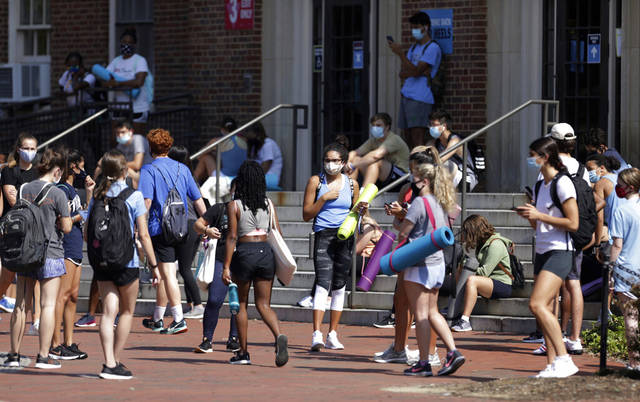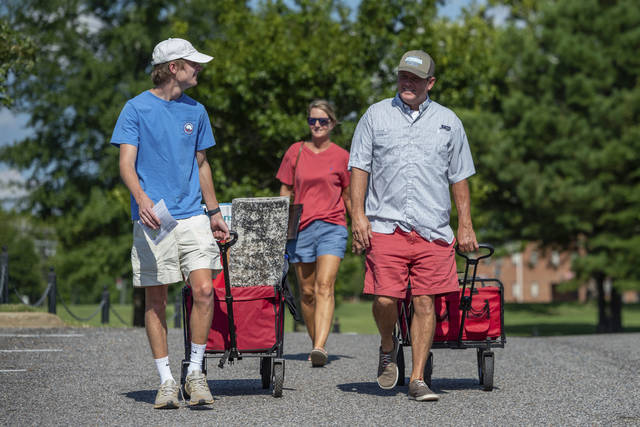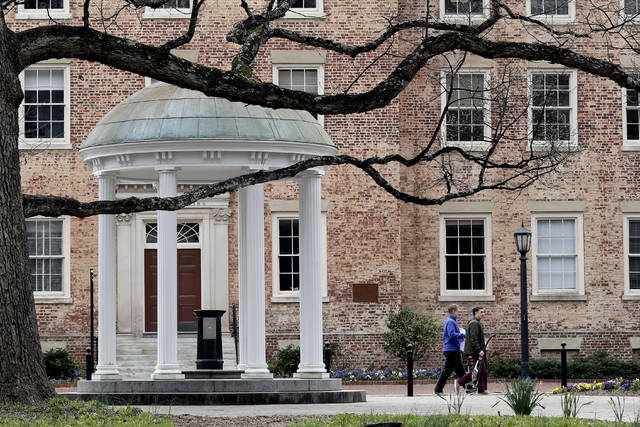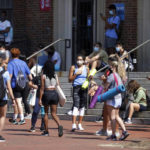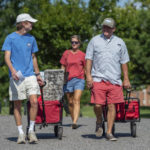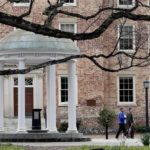North Carolina’s flagship university canceled in-person classes for undergraduates just a week into the fall semester Monday as the school and other campuses around the country scrambled to deal with coronavirus clusters linked in some cases to student housing, off-campus parties and packed bars.
The University of North Carolina at Chapel Hill said it will switch to remote learning on Wednesday and make arrangements for students who want to leave campus housing.
“We have emphasized that if we were faced with the need to change plans — take an off-ramp — we would not hesitate to do so, but we have not taken this decision lightly,” it said in a statement after reporting 130 confirmed infections among students and five among employees over the past week.
UNC said the clusters were discovered in dorms, a fraternity house and other student housing.
BREAKING: UNC has released its weekly COVID-19 dashboard update.
— The Daily Tar Heel (@dailytarheel) August 17, 2020
The dashboard now shows 135 new confirmed cases within the past week (324 cases total) and only four available rooms in the quarantine dorm remaining.
Check back soon for the full story.
Before the decision came down, the student newspaper, The Daily Tar Heel, ran an editorial headlined, “UNC has a clusterf*** on its hands,” though without the dashes.
The paper said that the parties that took place over the weekend were no surprise and that administrators should have begun the semester with online-only instruction at the university, which has 19,000 undergraduates.
“We all saw this coming,” the editorial said.
#UNC’s #COVID dashboard has been updated. Main takeaways: in 1st week of reopening, 130 students newly tested positive, with a positive test rate of almost 14% (double the statewide rate). On-campus quarantine spaces are almost full, though some are reporting it is already full. pic.twitter.com/mS2Gl85O8Z
— COVID Updates @ UNC (@CovidAtUNC) August 17, 2020
Outbreaks earlier this summer at fraternities in Washington state, California and Mississippi provided a glimpse of the challenges school officials face in keeping the virus from spreading on campuses where young people eat, live, study — and party — in close quarters.
The virus has been blamed for over 170,000 deaths and 5.4 million confirmed infections in the U.S.
The University of Notre Dame reported 58 confirmed cases since students returned to the South Bend, Ind., campus in early August. At least two off-campus parties over a week ago have been identified as sources, school officials said.
Paul J. Browne, vice president for public affairs at Notre Dame, said the university is prepared to suspend or otherwise discipline the hosts of such parties.
“We believe we have a very strong chain of health protection, but these parties represent the weak link in that chain, and they can be responsible for a disproportionate spread,” he said.
University officials in Tennessee, Georgia and Alabama were likewise frustrated by scenes of crowded bars and other nightspot areas on the first weekend many students returned to school.
In Tuscaloosa, the home of the football-mad University of Alabama, Mayor Walt Maddox appealed to students’ love of the game in urging them to take precautions.
“If you don’t want to protect yourself and you don’t want to protect your family and you don’t want to protect your friends and thousands of jobs, maybe, just maybe, you would want to protect football season so we can have it this fall,” Maddox said.
Some universities are moving ahead with fall classes as planned even as cases pop up. At Bradley University in Peoria, Ill., where a dozen students tested positive last month after an off-campus gathering, classes start Aug. 26, and students are moving into dorms this weekend.
“We have tweaked the move in process this year and are requiring students to sign up for a time slot so we can keep things spaced out and distanced,” university spokeswoman Renee Charles said.
Balancing the health risks with educating students has been keeping university presidents up at night, said Mildred García, head of the American Association of State Colleges and Universities. She said many are having to reconsider their plans as things change rapidly.
“They are doing the best they can with their staff and trying to educate the students about masks and social distancing and the effects of this virus,” she said.
“They’re doing all they can — and yet these are young people. When we think back about when we were young, sometimes you think you’re invincible.”


